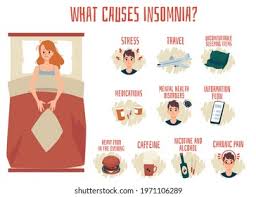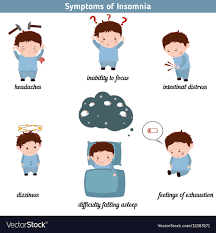What are the symptoms of insomnia? Do you want get rid of it?
Insomnia
Individuals with insomnia will’t fall asleep keep asleep or get enough relaxing slumber. Sleep disorder may be a common upset. Over time, lack of sleep can result in health issues like diabetes, cardiovascular disease and weight gain. Activity and life-style changes can improve your rest. Psychological feature behavioral medical aid (CBT) and sleeping pills conjointly help.
What’s insomnia?
Sleep disorder is a common sleep disorder that's characterised by difficulty:
Falling asleep initially.
Wakening throughout the night.
Waking previous desired.
What are the symptoms
of insomnia?
Chronic sleep disorder may cause:
1. Problem falling asleep and/or wakening within the middle of the night.
2. Problem returning to sleep.
3. Feeling tired/fatigued throughout the daytime.
4. Irritability or depressed mood.
5. Issues with concentration or memory.
What are the
categories of insomnia?
Sleep disorder will come back and go, or it's going to be an ongoing, long issue. There’s short term insomnia and chronic insomnia:
Short term insomnia tends to last for some days or weeks and is usually triggered by stress.
Chronic insomnia is once the sleep difficulties occur a minimum of 3 times per week for 3 months or longer.
Styles of sleep
disorder
There are 2 types of insomnia: primary and secondary.
Primary insomnia: this implies your sleep issues aren’t joined to the other health condition or problem.
Secondary insomnia: this implies you've got hassle sleeping as a result of a health condition
You may conjointly hear about: Sleep-onset insomnia: this implies you have trouble about to sleep.
Sleep-maintenance insomnia: This happens once you have hassle staying asleep through the night or rouse too early.
Mixed insomnia: With this kind of insomnia, you've got trouble each falling asleep and staying asleep through the night.
Incomprehensible insomnia: once you have paradoxical insomnia, you underestimate the time you're asleep. It seems like you sleep loads lower than you actually do.
Sleep disorder Causes
Primary causes of
insomnia include:
Stress regarding massive life events, sort of a job loss or change, the death of a cherished one, divorce, or moving
Things around you like noise, light, or temperature
Changes to your sleep schedule like jet lag, a replacement shift at work, or dangerous habits you picked up once you had alternative sleep issues
Your genes. Analysis has found that an inclination for sleep disorder could run in families.
Secondary causes of
insomnia include:
1. mental state problems like depression and anxiety
2. Pain or discomfort at the hours of darkness
3. Caffeine, tobacco, or alcohol use, also as use of illicit drugs.
4. Glandular disorder and other endocrine problems
5. Alternative sleep disorders, like sleep disorder or syndrome syndrome
6. Physiological state
7. Alzheimer' illness associated other styles of insanity
8. ADHD
9. PMS and change of life
Causes of sleep
disorder
Sleep disorder may result from a variety of physical and psychological factors. Often, the cause may be a temporary problem, resembling short stress. In another instances, insomnia stems from an underlying medical condition.
Common causes
include:
1. Having jet lag, change shifts at work, or managing the other changes to the body’s internal clock
2. The area being too hot, cold, or noisy, or the bed being uncomfortable
3. Caring for somebody within the house, if it disrupts sleep
4. Obtaining too littleTrusted supply work up
5. Having night terrors or dangerous dreams
In some people, stress or a mental state issue is chargeable for insomnia. someone is also experiencing:
· Depression
· Anxiety
· Major affective disorder
· Psychosis
Another health conditions that may limit sleep include:
· Syndrome syndrome
· An hyperactive thyroid
· Sleep disorder
· Chronic impeding pneumonic disease, called copd
· Chronic pain
Often, symptoms of another health issue or natural transition cause problem sleeping. Throughout menopause, for example, secretion amendments can result in night sweats, which may interrupt sleep.
Also, some people have a rare genetic abnormality known as fatal familial insomnia, that prevents sleep and may be life threatening.
Media technology in
the sleeping room
These devices may damage sleep patterns in adults. Recreational use once lights-out seems to extend the risk Trusted supply of insomnia, for example
Medications
Per the yank Association of Retired Persons, the
subsequent medications can cause insomnia:
5. Selective
5-hydroxytryptamine uptake inhibitor, or ssri, antidepressants
6. Angiotensin
changing enzyme, or ace, inhibitors
7. Angiotonin
receptor-blockers, or arbs
10. A
mix of glucosamine and chondroitin
Symptoms of sleep disorder
1. daytime fatigue or somnolence
2. irritability, depression, or anxiety
3. channel symptoms
4. Low motivation or energy
5. Poor concentration and focus
6. An absence of coordination, resulting in errors or accidents
7. Worry or anxiety about sleeping
8. Mistreatment medication or alcohol to sleep off
9. Tension headachesTrusted supply
10. Problem socializing, working, or finding out
11. An absence of sleep may be a key consider motorized vehicle accidents, per experts.
12. Styles of insomnia
sleep disorder can beTrusted
supply classified by duration:
1. Acute, transient sleep disorder may be a short problem.
2. Chronic insomnia will last for months or years.
Doctors conjointly
classify it by cause:
1. Primary insomnia is a problem by itself.
2. Secondary insomnia is a results of another health issue.
In addition, they
classify it by severity:
1. Gentle insomnia involves an absence of sleep that ends up in tiredness.
2. Moderate insomnia could have an effect on daily functioning.
3. Severe insomnia features a vital impact on daily life.
Doctors also take
into account alternative factorsTrusted supply once distinguishing the type of
insomnia, together with whether or not the person systematically wakes up too
early or has trouble:
1. Falling asleep
2. Staying asleep
Obtaining restorative sleep



Comments